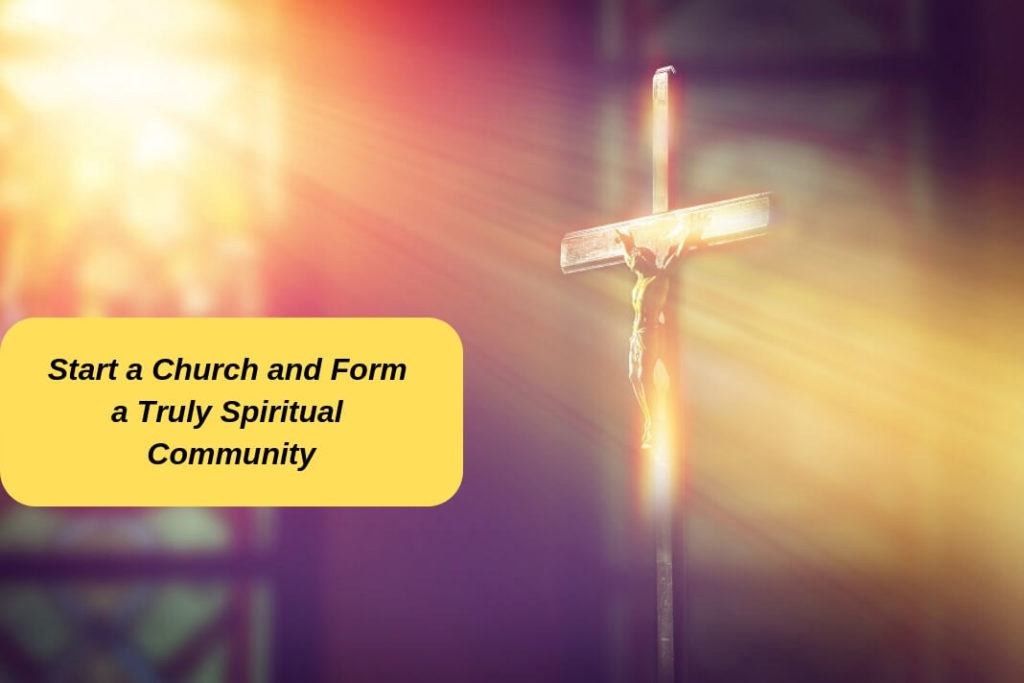
Every church is a spiritual community that is bound by people who have the same belief and faith towards the almighty. If your spirituality is calling you and you want to lead your own congregation, starting a church could be a rewarding idea. Every church’s foundation should be a passion for an unwavering faith. If your passion is in place, you will be greatly supported by your spiritual community, which you would need very much when starting a new church.
The process of starting a church could be difficult and challenging. You will doubt your abilities and calling, but faith and consistent support from fellow believers will help you cross the border successfully. Although no managerial skills or education qualifications are required to start a church community, a few leadership skills and communication could be handy.
In this article, we have put together the process of starting a church to get rewards in return.
Before You Begin, Pray, Follow, and Preach
You have to pray yourself, believe in your faith, and develop a long-lasting trust in your beliefs before you begin the process. If you want to be a preacher, you need to follow what you preach. Your church and the confessions you choose will determine the kind of preacher you become. There are church colleges and seminar courses that you can partake. The curriculum is compiled based on your particular confession and it differs from college to college. It is not necessary to go to a regular college. You can choose an online institution instead and study the course along with your regular job.
Before you start your life as a preacher, you need to ask yourself if this is what you want to be. Because once you get into this, you won’t be able to pull yourself back. You need to dedicate a lot of time, devotion, and strength to become a preacher. You have to commit to a cause and be prepared to lead the cause for several years.
What Kind of Preacher Would You Want to Be?
Meet with representatives from your chosen church and inquire about the requirements to be fulfilled to become a pastor there. Ask all of your doubts and concerns, and your future duties and responsibilities.
Many Christian organizations and churches do not ask for any former education or particular requirement from their preachers. However, your requirements will totally depend on the confessions you choose. For instance, you may have to take up a degree in religious studies or undergo theological training. Some churches require their preachers to finish specific courses, regardless of their degree in church studies. You need to look up websites of biblical colleges to understand the doctrines.
A preacher usually provides different kind of services, such as performing weddings, baptism, and funerals. You should also know how to offer psychological, grief and marriage counseling, arrange for Sunday sessions, religious events, community-based activities, and special children classes.
Prepare Your self for Ordination
Once you have completed your studies based on your church and congregations, you need to prepare yourself for ordination. Ordination means studying the doctrines of the church you selected and preparing yourself for an examination. The examination, which usually lasts for few hours, would be taken by the Ordination Council.
You need to gain some kind of preaching experience to become a capable preacher of your church. You can choose to either work as an assistant preacher of worship by means of internships or gain first-hand experience in other areas of the church, such as choir club or event management.
What Will Your Church Seem Like – Business Plan
You have to create a business plan before forming your church. You should have an idea how big your church will be, how many people would attend your services on an average, whether your church should be formal or informal, will you perform ceremonies, baptism or funeral, or all of the above, and will this be a full-time job or a part-time ministry?
You will have to think about the development strategy of the church and if you would like to organize any fundraising or philanthropic effort. You will also have to decide your financial aims, such as if your church would accept donations of any form.
The number of attendees to your service will determine the worship space of your church. If you expect only a few people to show up, you can probably start a ministry, such as in a private home or a café. However, if you anticipate a fully-grown church, with many event branches, you would need a sizable space for the crowds.
Your Church Location
Make sure the location of your church is in a calm and serene place, away from noises. Your Church should be comforting and rejuvenating. If you rent out or buy a space next to a mill, you will be thoroughly disturbed by the sound. A preferable location for the church should be residential colonies.
A Church and a Ministry vary in several ways. A ministry is an informal prayer group that meets once in a week or in 10 days in a pre-decided place. The group doesn’t have too many rules or regulations. A Church is a formal organization that is legally formed, just like how a non-profit organization is established. A church has many benefits and can be fruitful for long-term.
Establishing Your Church as a Legal Entity
You need to understand and follow the policies, rules, guidelines, and tax exemptions laid by the government before structuring your corporation. Your church should operate only for religious, educational, spiritual scientific and (or) charitable purpose. No private individuals will be involved and the net earnings will not go to any shareholder.
Your church cannot conduct any kind of illegal activity, should not support any political campaign or influence legislation, or (and) should not go against public policy.
Once this is agreed upon, follow the following steps of establishing an organization:
- Documents and Paper Work: Prepare paperwork for the organization. Apply for incorporation and tax exemption. Ask an expert advice, probably from a lawyer. He will be able to give you crucial legal insights and details on how to start a church. Crosscheck your application forms before you submit.
- Incorporate the Organization: You should get the business incorporation documents signed by your Local Corporation. Establish a belief statement and meet all the requirements, such as the licenses and permits that need to be obtained. A belief statement outlines the church’s religious practices and belief, which is duly signed by the Business Bureau in your state.
- Issue EIN: Every business, even a Non-Profit Organization such as a Church, must have an EIN from the IRS as per law. You need to log in to your state’s IRS website and look for SS4 form. Fill in the form and issue for your EIN.
- Bank Account: Once this is done, you will have to open a bank account for the funds you receive towards the church functioning. You can opt for a special bank that is dedicated to churches or ministries or go for an ordinary, private bank. The bank you choose will have little or no role to play in running your organization. So, there is no need to fret about it.
- If you are planning for a tax-exemption statement of belief, statement of faith and a 501 [c] [3] status certification are some of the main documents you need to craft, signed, and keep them ready.
- Insurance Cover: You should also consider getting an insurance policy to cover any loss caused to the church due to unexpected events, such as fire, theft, burglary or any accidents that take place inside the church. The insurance will safeguard your personal assets.
Congratulations, if you have accomplished the aforementioned steps, for now, your church is ready to invite people and start a service. Let us move on to the next steps, such as beginning a fellowship.
Name Your Church
Give a name to your church. You have to ensure that your chosen name binds focus. Your church name should increase the faith amongst people, raise the confidence of your fellowship, and increase your status. Don’t go with a name that is similar sounding to a nearby church. Avoid names that are already famous.
Start with a Home Spiritual Group
You need to build a decent fellowship of people with common faith and belief before making your church official. Connect with fellow believers and organize regular meetings. You need to have at least three founding members, who are not related by blood, to start the church.
You can establish the church at different levels based on the tax-exempt status, your commitment, your fellowship size, and your financial aims.
When you start your church, look for pre-Christians and non-believers to join you. It is the most difficult process, given to the fact that today everyone is opinionated and have their own beliefs. Don’t force anything upon anyone. Make new entrants comfortable, probe their pre-beliefs, and mold your beliefs into theirs so that they don’t think that they are lured into this.
Important Components that Your Church Should Include
Make your Church a place that is more than just a passion for faith. It should be a house of God, where the members sing together, eat together, pray together, and solve problems together. The three components that you should add to your Church include:
Meet-ups: Where fellowships gather to worship, to study bible, discuss verses, and discuss how scriptures are applied in life.
Eat Outs: If organizing a house church, encourage each participant to bring food and make it a pot-luck.
Small groups: Members of house church meet outside micro-church gathering, invite new members, and organize an art of living session revolving around church beliefs and faiths. You can also start gender and age-specific groups, and hold monthly or bi-weekly meetings. Include various activities to promote the purpose of your church.
In the Name of Lord
We are sure, by now, you are all set, at least mentally, to open a church. Do not haste in hiring people. Look for genuine volunteers. Gradually start new things and bring in new elements, such as programs and ministries. God will definitely test your faith; you may come across critics in all shapes, sizes, and forms. Ignore them and concentrate on your calling. That being said does not ignore the local churches and their practices. Meet members more often and create a blissful state. Don’t talk about religion, but discuss beliefs, faith, principles, love, and art-of-living rather.
Hope this article showed you the right path in establishing a church in your city. If you have any doubts or clarifications, please mention it in comments below. We shall get back to at the earliest.




